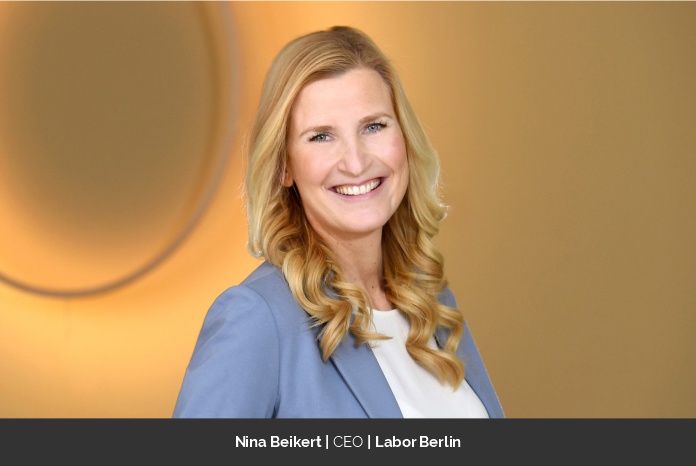Nina Beikert: Making a Difference in Patient Care
Top 10 Most Inspiring CEOs to Watch Out For in 2023

Always having been passionate about
healthcare, Nina Beikert couldn´t think of a finer purpose
than having the chance to make a difference in patient care. Nina is the CEO of Labor
Berlin, a joint venture of Charité that is one of Europe’s major university
hospitals, and Vivantes, the biggest municipal hospital group in Germany.
According to Nina, there is no such thing
as a typical workday for her. She is in charge of Labor Berlin’s nine
laboratory sections, ranging from high throughput testing to highly specialized
diagnostics, as well as marketing, sales, IT, and facility management.
Therefore, her working days are much diversified: from automation projects, the
development of new services, 1:1s with her direct reports, to negotiating
contracts with the business’s customers. She says, “There is a broad
variety of topics that I am in charge of, which makes my job very interesting.”
Before Starting Corporate Journey
Nina grew up and was raised in the south of
Germany. Sport has always been a love of hers, so she experimented with several
activities before settling on her favorite sport, basketball, and joined the
German Bundesliga. She attended the universities of Mannheim, Germany and
Pamplona in Spain, where she studied Business Administration and Romance
languages. Since women´s basketball doesn´t pay off very well in Germany, she
held lectures in math’s and statistics to earn some money for her life and
travels.
Nina began her professional career in the
diagnostic field in 2007. She took advantage of a fantastic chance to
participate in a trainee program at Roche, one of the world’s leading medical
diagnostics companies, with a focus on leadership. The knowledge she gained
during that time, as well as the accompanying leadership and personal skills
training, the intense and helpful feedback she received from her mentor, and
the network she was able to build through various projects, all aided her
greatly when she began her first leadership position immediately following the
trainee program.
After four years as Head of Sales in
North/Eastern Germany for laboratory diagnostics, Nina was given the position
of Managing Director of Labor Berlin, a new and promising company. She
says, “With Fabian, I have a great colleague in the Executive Board,
and together we can rely on an exceptional team of more than 700 brilliant,
caring, and talented employees.”
Nina chose to remain as long as she could
still help Labor Berlin to reach its vision and at the same time learn and
grow, which she has done for the past few years.
Labor Berlin
Labor Berlin, founded in 2011, is currently
Europe’s largest hospital laboratory and one of Germany’s three most innovative
mid-size companies. The organization specializes in medical diagnostics for big
hospitals and specialized healthcare facilities in Germany, with a strong focus
on cutting-edge specialty testing and new diagnostics.
Even remaining up to date in the medical
field is difficult: innovation cycles are short, and there are continual quick
breakthroughs and knowledge development. As a result, the staff at Labor Berlin
are constantly reviewing and adapting their services and procedures to meet new
demands.
The company is built on four pillars: its
employees’ vast experience, competence, and dedication, an innovative culture,
a close relationship with customers to understand their evolving needs, and
close collaboration with Charité’s medical faculty as well as the research
departments of its diagnostic partners. Nina opines, “We have professionalized
our innovation process and reinvest a lot of our revenues in order to foster
and facilitate innovative projects and ideas.”
Setting Examples during Crisis
Nina’s biggest challenge so far was
managing the Corona crisis. Labor Berlin was the first laboratory in Europe to
offer SARS-CoV-2-PCR-tests on a regular basis for patients. The result was a
flood of samples from all over the continent right at the beginning of the
crisis.
Besides managing the running business, the
team had to establish new processes, find a lot of new employees, take new
analyzers into routine operation, etc. to handle all those additional samples.
She recalls, “Pressure was extremely high, for Labor Berlin suddenly
played a major role in fighting the pandemic with a substantial
responsibility.” She further adds, “We became the “backbone”
of patient care for all the patients in most of the hospitals in the German
capital and many of the testing centers in the city.” Almost 50% of
all Corona samples in Berlin were analyzed in the central laboratory of Labor
Berlin, which also led to a distinct public focus on its work. According to
Nina, the team knew that there was no option but to perform and make sure that
they would be up and running at any time.
Nina realized that the decisions she had to
make at short notice could have a major impact for thousands of patients every
day. She literally felt her personal responsibility in that regard, and also a
responsibility for her team. “Without the amazing colleagues in all
different departments of Labor Berlin, it would not have been possible to
manage all such extraordinary challenges,” says Nina. Everyone gave
their best and walked more than the extra mile. She asserts, “We had
crisis calls every day to decide what to do next and how to handle all the
challenges we were facing, from lacking face masks, tests, and analyzers to
organizing childcare when kindergartens closed – up to eventually having to
deal with and support staff members that got infected or had to stay in quarantine.”
As per Nina, looking back it was a very
challenging and tough time, but it gave her the chance to learn during a short
time more than she could have learned in many years without the crisis.
These are the most valuable lessons Nina
learned:
- Teamwork is the key and the most important task in leadership
is to build an excellent and motivated team that one can rely on. Empower
all team members to work autonomously and enable them to give the best
they can. Such a crisis cannot be handled if everything has to be decided
or controlled by just one person. In times of crisis, all hands must be on
deck.
- Consider alternatives and have the courage to take hard
decisions. One has to accept that, most of the time, there will not be one
option that fits 100%. Choose the one that is closest, at least to what
you have understood – and accept that waiting to be absolutely sure is not
the right way in times of crisis.
- Give the very best you can – and accept that there will still
be a chance of failure. You cannot control everything. But you can do your
best at any time.
- Listen to your moral compass when making hard decisions.
Supporting Others to Improve
“A team can be way more than the sum of
its parts, and so is the team of Labor Berlin,” says
Nina. In this way, she views her greatest accomplishment as a leader to have
formed the best team she could conceive of out of capable individuals. She has
effectively built a team in which everyone is capable of growing above their
current level.
She recalls, “A very special moment
that made me proud: A member of my team recently thanked me for supporting her
with my feedback and mentoring to develop her full potential and told me that I
am her role model in leadership. She now wants to pass on her experience to her
direct reports in the same way that I did with her. To me, that is the greatest
feedback that I could get as a leader.”
Integrating Work and Life
Nina believes in integrating work and life
rather than talking about work-life-balance. In her opinion, such discussions
stress most people more than they help. She says, “Like most of us, I
spend a lot of my lifetime working and I do not want to wait until my working
day ends to start living.”
Nina aims to work with people that are not
only top professionals, but also great people that she likes to spend time
with. She adds, “I found myself a job that I am passionate about:
learning new things, finding solutions, going new ways, and especially leading
a team of very smart, dedicated, and diverse individuals that challenge me
every day and help me grow. Plus, there is no better purpose that I could think
of than contributing to improving healthcare.”
More Improvements in the Future
The vision of Labor Berlin is to become the
top innovator in laboratory medicine and to shape the diagnostic future, in
order to improve patient care. Nina’s personal goal is to constantly
improve to become a better leader. She states, “I am supporting my team
members and mentees to become more successful than I am.”














